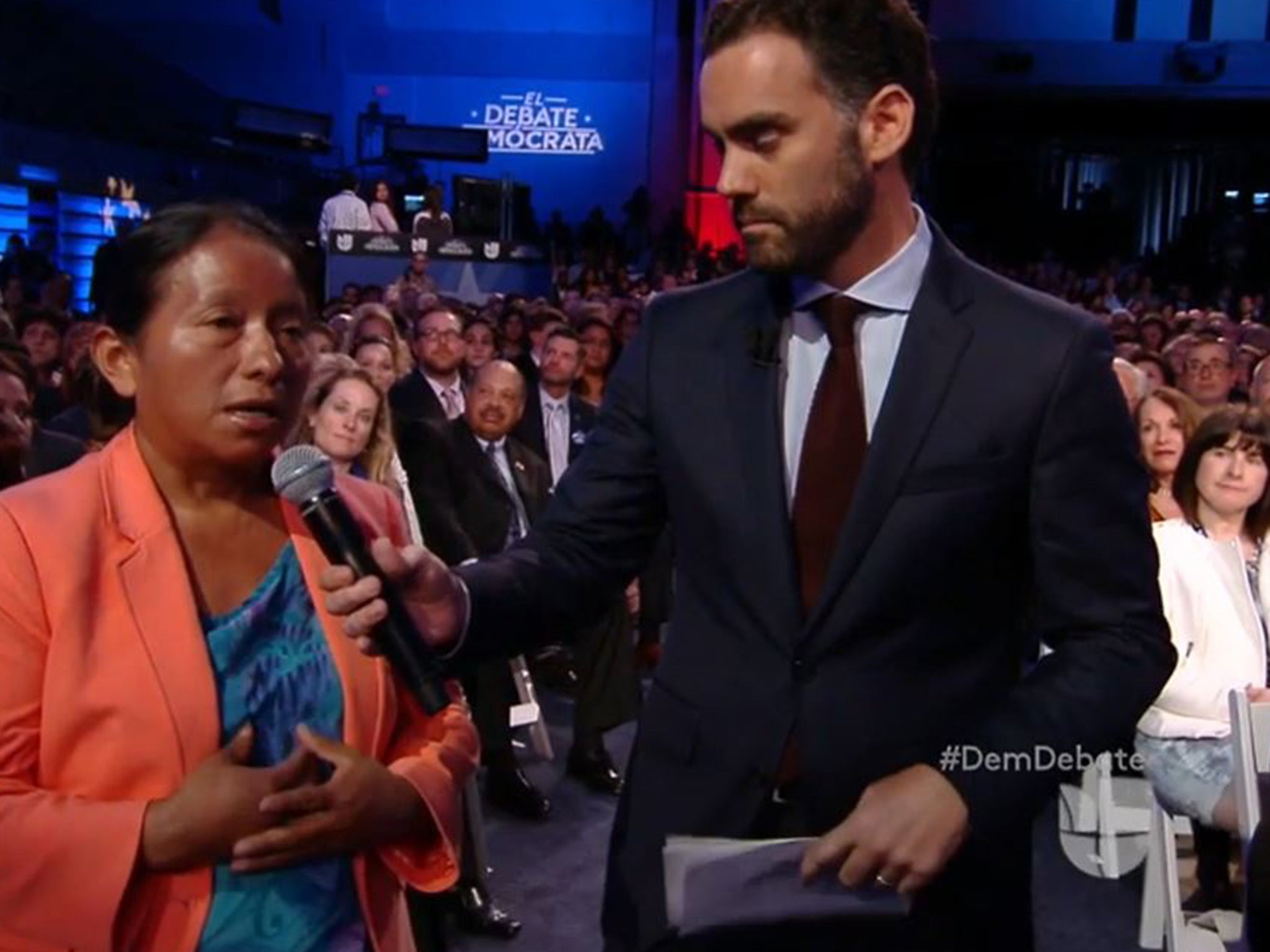Donald Trump: The moment when the mogul's immigration policies were made real for all to see
Lucía Quiej explained that she is the mother of five children - kids who have not seen their father in three years

Your support helps us to tell the story
From reproductive rights to climate change to Big Tech, The Independent is on the ground when the story is developing. Whether it's investigating the financials of Elon Musk's pro-Trump PAC or producing our latest documentary, 'The A Word', which shines a light on the American women fighting for reproductive rights, we know how important it is to parse out the facts from the messaging.
At such a critical moment in US history, we need reporters on the ground. Your donation allows us to keep sending journalists to speak to both sides of the story.
The Independent is trusted by Americans across the entire political spectrum. And unlike many other quality news outlets, we choose not to lock Americans out of our reporting and analysis with paywalls. We believe quality journalism should be available to everyone, paid for by those who can afford it.
Your support makes all the difference.There have been moments, many many moments, in the 2016 election cycle related to immigration.
Talk of walls and bigger, more beautiful walls, along with uniform and absolute deportation of the nation's estimated 11 million undocumented immigrants have been connected time and time again to making the United States great, strong, an overall and undisputed global winner. You know the deal.
But on 9 March, whatever portion of the country watching the the Washington Post-Univision debate got a quick but pretty difficult-to-forget glimpse of the human lives that mass deportation would alter — and hints of the economic challenges that such policy might create.
A woman named Lucía Quiej, who in a story posted by Univision on 8 March was identified as an undocumented immigrant who hails from Guatemala, in a voice that at times broke with emotion, explained that she is the mother of five children — kids who have not seen their father in three years. That is the time that has passed since Quiej's husband, a man she described as a diligent construction worker, was caught driving without a license and deported.
Quiej's story is incredibly common among the more than 3.7 million people who have been deported during the Obama administration. And it carries within it hints of some of the complications, challenges and perhaps not at all anticipated crises that might be created by any effort to uniformly and forcibly remove 11 million people.
In 1999, the US government estimated that 1 in 10 families in the United States with children were so-called “mixed status” families. That's the phrase used to described households where members hold what are sometimes a variety of immigration and citizenship statues. Since that time, the country's undocumented immigrant population has grown. A more recent but still aged estimate produced by the Pew Research Center in 2009 put the count of mixed-status families at an estimated minimum of 16.6 million people. That a massive number of people in Quiej's situation or at risk of it.
A 2014 New York Times review of government data found that about two-thirds of what at that time were the nearly 2 million people deported were people who committed “minor infractions including traffic violations or had no criminal record at all.” About 20 percent had been convicted of serious crimes.
But Quiej is one woman, one mother, trying to raise five children.
So she didn't speak about the fact that, in 2012, 16 percent of construction-industry laborers were undocumented immigrants. She did not mention that there are thousands of communities where immigrants — legal and illegal — and their children represent the bulk of the population growth that has occurred in the last 15-plus years. That means that an entire industry and the economies of many rural and small towns, as well as some former industrial centers and bedroom communities, are pretty dependent on these workers and their spending.

Quiej didn't say that, in 2011, the left-leaning Applied Research Center found evidence that at least 5,100 children were living in foster care because one or more parent had been deported and estimated that, if deportations continued at the same pace, that figure would grow to 15,000 by 2016. And the government's own data tells us that more than half a million parents have been deported — some of them separated from their children for years or permanently — between 2009 and the middle of 2015.
This is how Quiej began:
“I have experienced deep pain...”
Quiej's voice cracked with the sound of partially suppressed emotion. Then she asked the two people standing on the debate stage and vying for the Democratic presidential nomination what they would do for families like hers.
For the hardhearted and those wedded to the idea of a no-compromise, no-amnesty, mass-deportation plan, this was a moment full of distracting human detail. But for the remainder of America, there were hints in Quiej's question of the less than clear situations — social, legal and economic disarray — that most experts anticipate any effort to deport 11 million people, with no exceptions, would almost certainly bring.
It was a remarkable moment in a year in which people like Quiej have been a central part of the national political debate. But their stories, their voices, their actual experiences have not. It was one of those moments — an undocumented immigrant woman outed herself on national TV to ask a question — that puts to shame the spin doctors and the various political insiders who demand anonymity to make even the most innocuous comments.
And at the very least, stories like Quiej's demonstrate how complex the nation's immigration situation has become and therefore, how resistant it is likely to be to simple solutions.
Copyright: Washington Post
Join our commenting forum
Join thought-provoking conversations, follow other Independent readers and see their replies
Comments